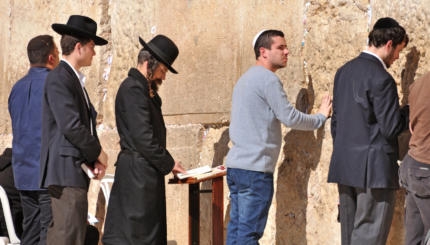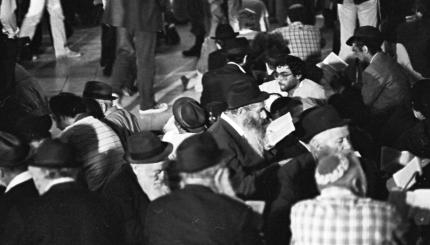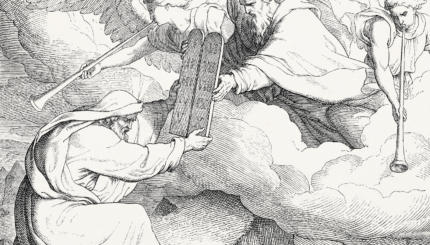Generally speaking, while Judaism obviously attaches great significance to intellectual honesty, as evidenced, for example, in the constant quest for the truth in ic debates and among the medieval philosophers, the main thrust in the appeals for Jews to be truthful is in the direction of moral truth and integrity.
An often quoted rabbinic saying ([Babylonian Talmud] Shabbat 55a) is: “Truth is the seal of the Holy One, blessed be He.” In Rashi’s explanation [Rashi is the foremost medieval commentator on the ], this saying refers to the Hebrew word for truth, emet, formed from the first letter of the alphabet, alef, the middle letter, mem, and the final letter, tav. The God of truth is found wherever there is truth and His absence is felt wherever there is falsehood.
The prophet similarly declares: “The Lord God is truth” (Jeremiah 10:10) and the Psalmist declares: “Thy Torah is truth” (Psalms 119:142). Of the verse in Psalms: “And speaketh the truth in his heart” (Psalms 15:2), one explanation by the Jewish moralists is that the God-fearing man should keep his promise even if he only made it in his heart, even if it was no more than a promise he had kept to himself without revealing it to the one to whom he made it.
This is based on the talmudic tale of Rav Safra ([Babylonian Talmud] Makkot 24a). Rav Safra was approached to sell something he had and was offered a price which suited him, but he was unable at the time to signify his consent because he was reciting his prayers and was unable to interrupt them. The prospective buyer, under the impression that the rabbi had rejected his bid, kept on increasing the price but the rabbi insisted on selling for the original price to which he had consented “in his heart.” Naturally, this kind of exemplary conduct was not intended for all, otherwise it would not have been recorded for a saintly man like Rav Safra. But the stern injunctions throughout Jewish literature against cheating and dishonesty in business affairs and in other areas of life are directed toward every Jew, as when the prophet says of his people: “They have taught their tongue to speak lies, they weary themselves to commit iniquity” (Jeremiah 9:4).

Help us keep Jewish knowledge accessible to millions of people around the world.
Your donation to My Jewish Learning fuels endless journeys of Jewish discovery. With your help, My Jewish Learning can continue to provide nonstop opportunities for learning, connection and growth.
Among the many rules regarding dishonesty in commercial transactions, the following can be quoted as illustrations. The (Bava Batra 5:10) rules: “A shopkeeper must wipe his measures twice a week, his weights once a week, and his scales after every weighing.” On the verse, “Ye shall do no unrighteousness in judgment, in meteyard, in weight, or in measure” (Leviticus 19:35), the Talmud comments: “ ‘In meteyard’ refers to the measurements of the land, that he may not measure for one in summer [when the measuring line is contracted through the heat] and for another is winter; “in weight,” he may not keep his weights in salt [to make them heavier]; “in measure,” he may not make the liquid produce a foam.”
Deceiving others is strictly forbidden: “The Holy One, blessed be He, hates a person which says one thing with his mouth and another in his heart” ([Babylonian Talmud] Pesahim 113b). Defrauding by the seller overcharging or the buyer [underpaying] is condemned, and the Mishnah (Bava Metzia 4:10) states: “As there is wronging in buying and selling, there is wronging with words. A man must not ask: ‘How much is this thing?” if he has no intention of buying it.”
The fourteenth-century moralist, Isaac Aboab, in his Menorat Ha-Ma’or (“Candelabrum of Light”) gives what is no doubt in part a counsel of perfection; yet many Jews, aware of the severe demands he makes, did try to live up to them, judging by the frequency with which the work is referred to in the literature of Jewish piety. Aboab writes:
There are other matters which fall under the heading of falsehood; for example, when a man praises himself for having virtues he does not really possess. It sometimes happens that a man may persuade his friend into believing that he has spoken well of him or done him a good turn when, if fact, he has done nothing of the kind. In this connection our Rabbis teach that it is forbidden to mislead others even if they are heathens. Another example is one who promises to do something for his neighbor and fails to carry out his promise. All this is to fulfill the verse: “The remnant of Israel shall not do iniquity, nor speak lies, neither shall a deceitful tongue be found in their mouth” [Zechariah 3:13].
The meaning is that even where nothing iniquitous is involved, they shall not have a deceitful tongue in their mouth but all their words should be truthful. Some liars mislead their neighbors into believing that they are friends, who have their welfare at heart, but their real purpose is only to win their neighbor’s confidence so as to be able to harm him. Of those it is said: “One speaketh peaceably to his neighbor with his mouth, but in his heart he layeth his wait for him” [Jeremiah 9:8]. The verse goes on to say: “Shall I not punish them for these things? saith the Lord; shall not My soul be avenged on such a nation as this?”
Other liars have their eyes on future benefits and tell lies in order to persuade their neighbors to give them gifts. Other liars mislead their neighbors by telling lies so as to obtain something of value from them or from others so that they can steal it for themselves. The Rabbis compare this to idolatry for this is precisely what the idolaters do when they pretend that their gods have power.
Yet, for all the high value it attaches to truthfulness, the Jewish tradition is sufficiently realistic to acknowledge that there are occasions when the telling of a “white lie” can be in order; for instance, where the intention is to promote peace and harmony ([Babylonian Talmud] Yevamot85b). The [Babylonian] Talmud (Bava Metzia 23b-24a) observes that a scholar will never tell a lie except in three instances of “tractate,” purya, and “hospitality.” The commentators explain “tractate” to mean that a modest scholar is allowed to declare that he is unfamiliar with a tractate of the Mishnah in order not to parade his learning. Rashi translates purya as “bed” and understands it to mean that if a scholar is asked intimate questions regarding his marital life he need not answer truthfully. The Tosafot [authorities of a certain later school, commenting on Rashi’s comments] find it hard to believe that such questions would be addressed to the scholar or anyone else and they understand purya to be connected with the festival of Purim. If the scholar is asked whether he was drunk on Purim, he is allowed to tell a lie about it. “Hospitality” is understood to mean that a man who has been treated generously by his host may decide not to tell the truth about his reception if he fears that as a result the host will be embarrassed by unwelcome guests.
Reprinted with permission from The Jewish Religion: A Companion, published by Oxford University Press.


